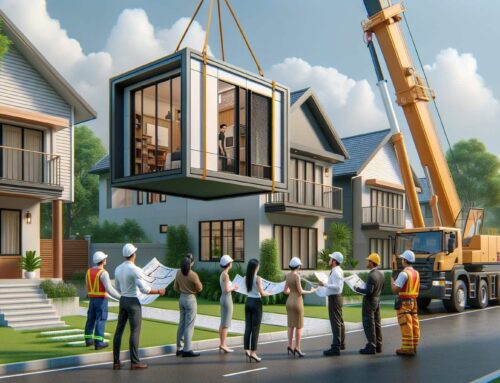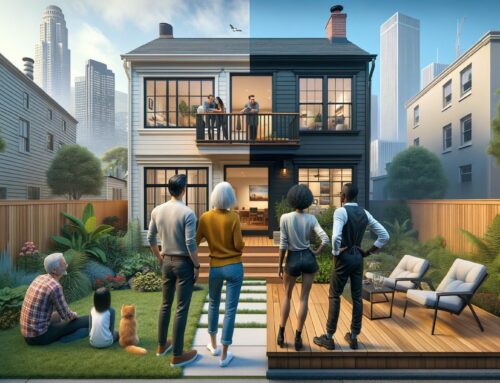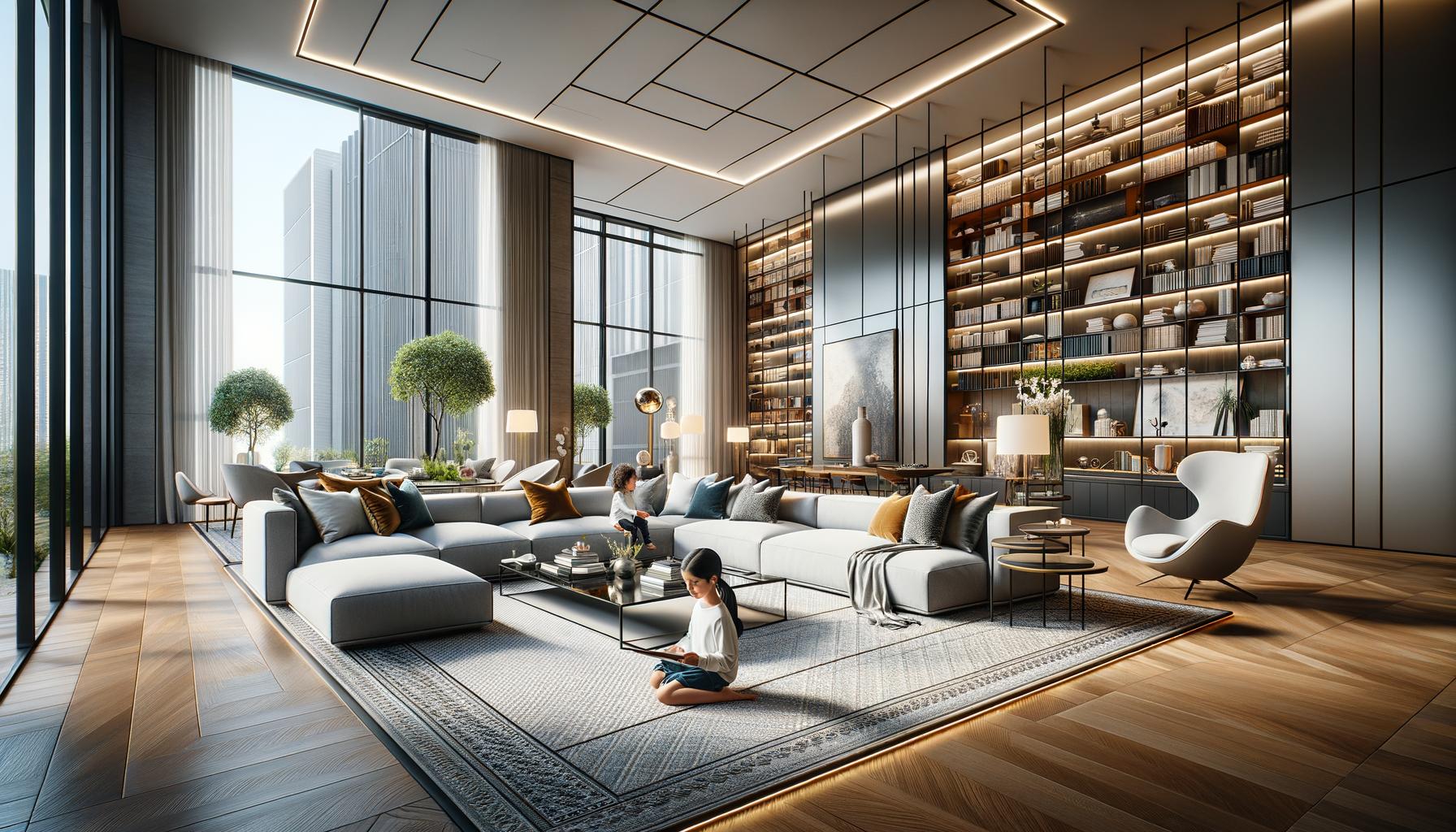
At Home Owners Association, we understand the transformative power of a well-designed lounge room. Your living space should be a reflection of your personal style and a haven for relaxation.
Are you looking for lounge room renovation ideas to breathe new life into your home? This guide will walk you through the process of revamping your space, from initial planning to final touches.
How to Assess Your Lounge Room’s Potential
Measure and Map Your Space
Start your lounge room renovation by creating a detailed floor plan. Measure the room’s dimensions and note the location of windows, doors, and fixed features (like fireplaces or built-in shelving). This map will become your blueprint for planning furniture arrangements and visualizing potential changes.
Identify Your Pain Points
Walk through your lounge room and list what doesn’t work. Ask yourself: Is there enough seating for guests? Does the lighting suffice in the evenings? Do you have adequate storage? Pinpoint these issues to establish clear goals for your renovation.
Analyse Traffic Flow
Observe how people move through the space. Look for bottlenecks or awkward pathways. A well-designed lounge room should allow easy movement and comfortable conversation areas. Consider furniture rearrangement to improve flow before making structural changes.
Evaluate Natural Light
Take note of how sunlight enters your lounge room throughout the day. Identify areas that are too dark or prone to glare. This information will help you plan lighting solutions and window treatments that enhance the room’s ambience.
Set a Realistic Budget
Determine your investment for the lounge room renovation. Research the costs of materials and labour for your planned changes. Recent data shows that a basic renovation in Australia costs around $20,000-$40,000, while a high-end renovation can cost significantly more. Your specific budget will depend on your project’s scope and the quality of finishes you choose.
Include a contingency fund of about 10-20% for unexpected expenses. This buffer will help you avoid financial stress if surprises arise during the renovation process.
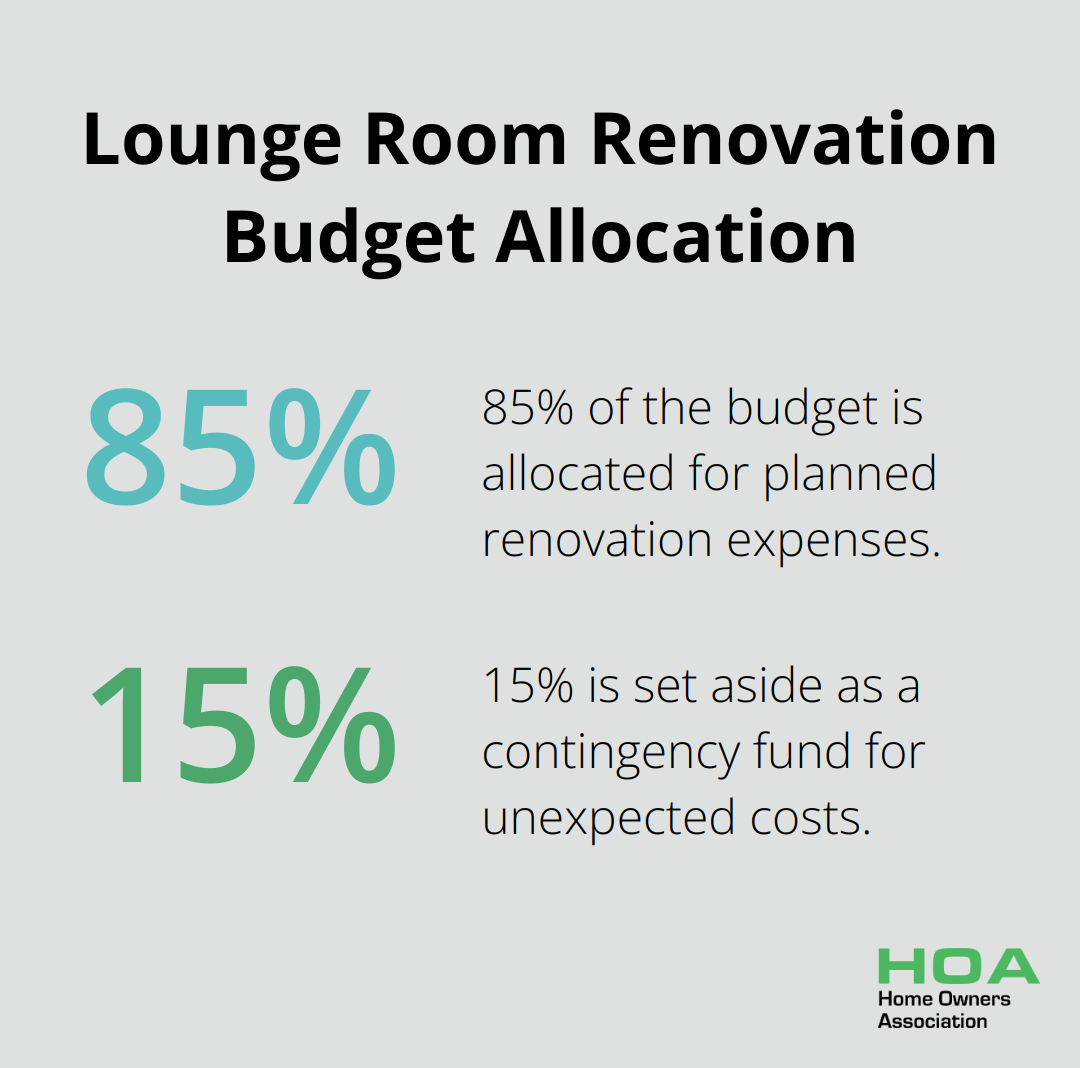
This thorough assessment of your current living space equips you with the knowledge to make informed decisions. Now that you’ve laid the groundwork, it’s time to explore the exciting design elements that will bring your vision to life.
How to Choose Design Elements for Your Lounge Room
Colour Scheme: Set the Mood
Your colour palette establishes the tone for the entire room. In 2025, earthy tones and soft neutrals dominate the trend landscape. These colours create a warm, inviting atmosphere perfect for relaxation. Apply the 60-30-10 rule: 60% of the room in a dominant colour, 30% in a secondary colour, and 10% in an accent colour. This balance ensures visual interest without overwhelming the space.
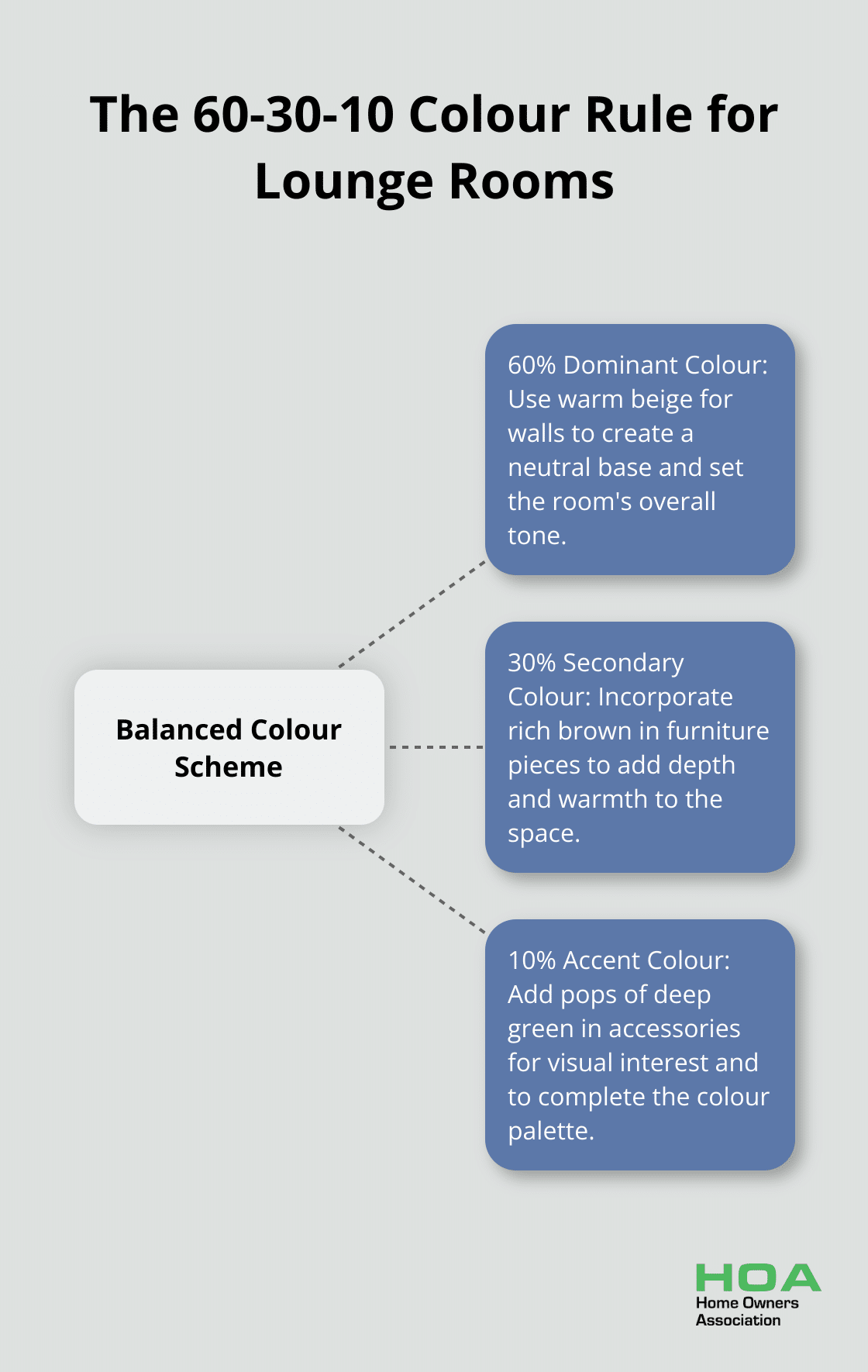
For example, select a warm beige for walls (60%), incorporate rich brown furniture (30%), and add pops of deep green in accessories (10%). This combination creates a natural, grounding effect that’s both modern and cosy.
Furniture: Balance Comfort and Function
When selecting furniture, prioritise pieces that serve multiple purposes. Look for ottomans with hidden storage, extendable coffee tables, or modular sofas that you can rearrange to suit different needs.
Consider the scale of your furniture in relation to your room size. Oversized sofas can make a small room feel cramped, while tiny furniture can look out of place in a large space. Measure your room and doorways carefully before making any purchases to ensure a perfect fit.
Lighting: Create Layers for Ambiance
Effective lighting can transform your lounge room from dull to dynamic. Try a layered lighting approach:
- Ambient lighting: Use ceiling fixtures or recessed lights for overall illumination.
- Task lighting: Add table lamps or floor lamps near reading areas or workspaces.
- Accent lighting: Highlight artwork or architectural features with wall sconces or picture lights.
Smart lighting systems are gaining popularity, allowing you to adjust brightness and colour temperature throughout the day.
Textures and Accessories: Add Depth
Incorporate a variety of textures to add visual interest and comfort to your lounge room. Mix smooth surfaces like leather with plush fabrics like velvet or wool. Layer rugs to define spaces and add warmth underfoot. Window treatments not only control light but also contribute to the room’s overall texture and style.
When it comes to accessories, quality trumps quantity. Choose a few statement pieces that reflect your personal style rather than cluttering the space with numerous small items. A large piece of artwork can serve as a focal point, while carefully curated decorative objects can tell your story without overwhelming the room.
Your lounge room should reflect your lifestyle and preferences. These design elements will help you create a space that’s not only beautiful but also perfectly suited to your needs. Now that you’ve explored the key design components, let’s examine the pros and cons of DIY renovations versus hiring professionals for your lounge room transformation.
DIY or Pro: Choosing the Right Approach for Your Lounge Room Renovation
The DIY Option: Benefits and Challenges
Renovating your lounge room yourself can yield significant rewards. Lack of land, soaring interest rates and high construction costs means renovating is an alluring option for homeowners. These savings allow you to invest in higher-quality materials or additional features.
However, DIY renovations demand substantial time. A project that professionals complete in a week might take months for a DIY enthusiast working part-time. You’ll also need to factor in the cost of tools and equipment, which can accumulate quickly if you don’t already own them.
When Professional Help Is Necessary
Certain aspects of lounge room renovation require expert assistance. Electrical work, for instance, must be handled by a licensed electrician. In Australia, it’s illegal (and potentially dangerous) for unlicensed individuals to perform electrical work, and doing so can invalidate your home insurance.
Structural changes, such as wall removal or window alterations, also necessitate professional input. A building surveyor or structural engineer should assess the impact of these changes on your home’s integrity. The cost of their expertise far outweighs the potential risks of DIY structural modifications gone awry.
The Hybrid Approach: Combining DIY and Professional Work
Many successful lounge room renovations blend DIY efforts with professional work. You might hire a carpenter to construct custom shelving units but paint them yourself. Or you could engage a plasterer to skim coat your walls, then take on the task of wallpapering.
This hybrid strategy allows you to reduce labour costs where your skills permit, while ensuring critical elements are completed to a high standard. It’s an approach that balances quality with cost-effectiveness.
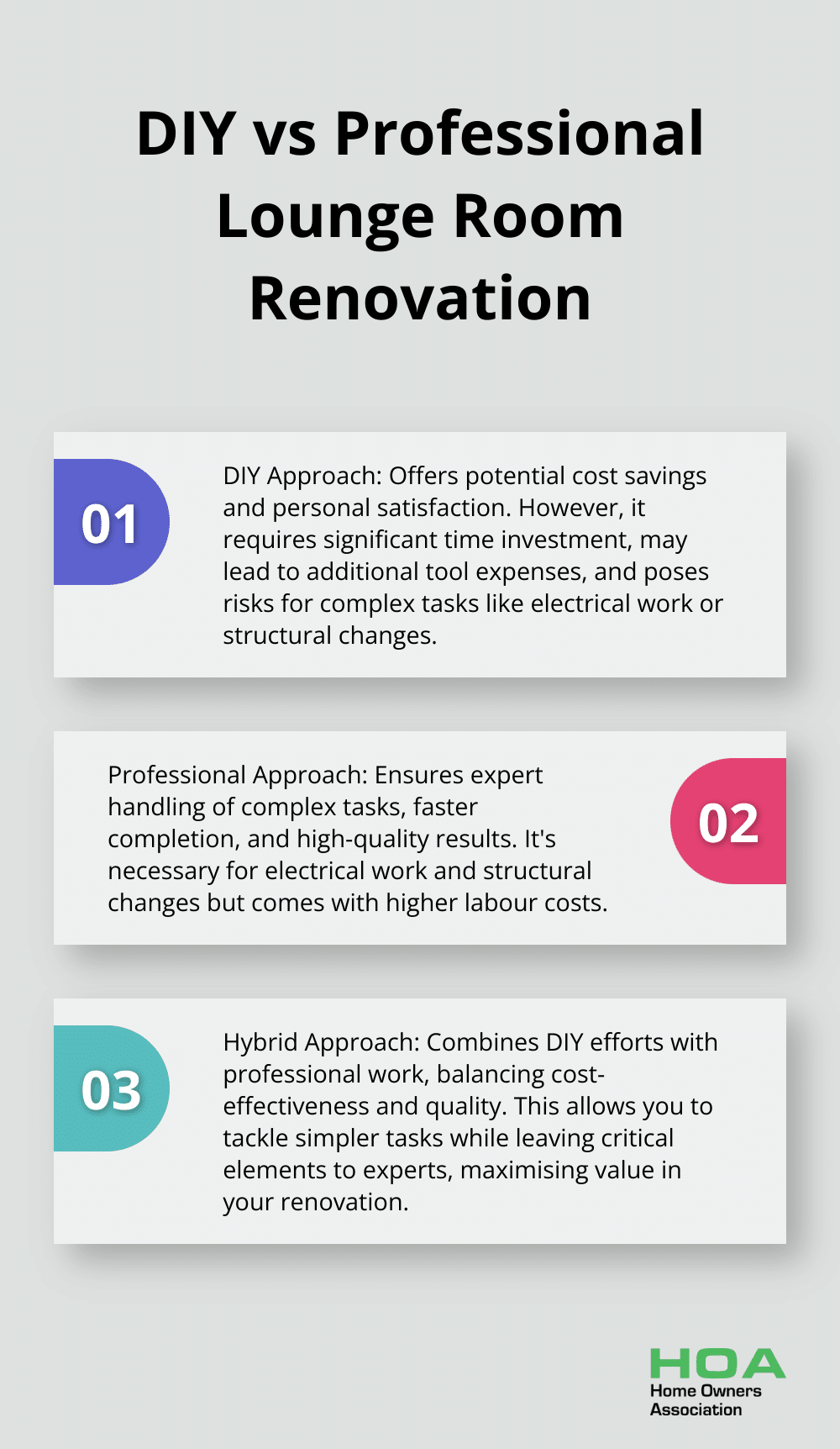
Tips to Maximise Value in Your Renovation
Regardless of your chosen approach, you can stretch your renovation budget with these strategies:
- Plan meticulously: Detailed planning reduces costly mistakes and changes mid-project.
- Source materials wisely: Take advantage of trade discounts (available through organisations like Home Owners Association).
- Consider timing: Renovate during off-peak seasons for better contractor rates.
- Reuse and upcycle: Get creative with existing furniture or find second-hand pieces to refinish.
- Focus on impact: Prioritise changes that will significantly improve your lounge room’s functionality and aesthetics.
The ultimate goal is to create a lounge room that enhances your lifestyle while adding value to your home. Careful consideration of your skills, budget, and desired outcome will guide you to the right renovation approach for your unique situation.
Final Thoughts
Transforming your lounge room will enhance your living space and home value. We explored various lounge room renovation ideas, from assessing potential to selecting design elements and deciding between DIY and professional approaches. The key to success lies in thorough planning, realistic budgeting, and thoughtful design choices that reflect your personal style and meet your functional needs.
Your lounge room should blend comfort, functionality, and aesthetics. Focus on creating a space that resonates with you and your lifestyle, considering the latest trends while prioritising timeless choices. For those in Melbourne, Australia, embarking on a renovation project, the Home Owners Association offers valuable resources and support.
As you move forward with your lounge room transformation, stay flexible and open to creative solutions. Unexpected challenges may arise (but with proper planning and the right resources, you can overcome them). Your revitalised lounge room awaits – it’s time to turn your vision into reality and craft a space that truly feels like home.


